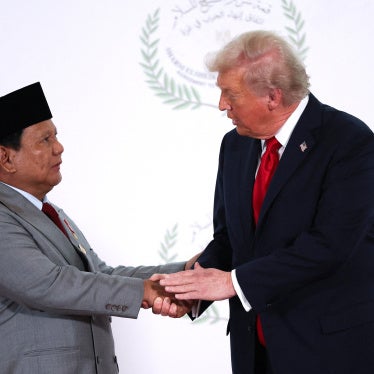A proposed international treaty to address the damaging effects of mercury should include specific provisions to protect the health of children and other vulnerable populations, Human Rights Watch said today. Governments are to meet in Geneva beginning January 13, 2013, for a fifth and final round of talks for the treaty. Mercury is a toxic metal that attacks the central nervous system and is particularly harmful to children.
So far, the draft treaty has been focused on the environment and neglected the important role that the health sector has to play in addressing the problems caused by mercury, Human Rights Watch said. Western governments have resisted including stronger health provisions.
“Delegates to the mercury treaty negotiations should seize this last chance and draft effective health strategies to prevent and treat mercury poisoning,” said Juliane Kippenberg, senior researcher at Human Rights Watch. “Millions of people around the globe are exposed to mercury on a daily basis, in artisanal mining and elsewhere. There is a dire need for stronger prevention and treatment of mercury poisoning.”
Human Rights Watch research has documented how small-scale gold miners use mercury to extract gold from the ore, and risk mercury poisoning as a result. At least 13 million people work as artisanal gold miners globally, including many children. Few are aware of the harm mercury can cause.
In Mali, Human Rights Watch interviewed children as young as 11 about their daily work with mercury. InPapua New Guinea, a doctor told Human Rights Watch researchers about the impact of mercury on small-scale gold miners: “We have dozens of cases of mercury poisoning. ….They stare blankly at the wall. You cannot talk to them, they are not conversant, nothing. They are like zombies. And we have several cases that did not recover.”
Many health systems are ill-equipped to address mercury poisoning. During a Human Rights Watch investigation in Tanzania, a medical officer in a mining area expressed concern that health workers were “failing to diagnose” people suffering from mercury poisoning because they lack training.
A proposal by Latin American governments for a stand-alone article on health in the mercury treaty was a positive move, Human Rights Watch said. The article should require more public health information, research, surveillance, testing, treatment, and capacity-building of health systems to respond to mercury exposure. In a submission to governments, Human Rights Watch proposed specific language for a health article.
Human Rights Watch welcomed the fact that the current treaty article on small-scale gold mining requires parties to undertake public health activities for artisanal mining communities, but said this is not sufficient to address the problem. Mercury is used in a variety of areas, and as a result affects many different populations. Among other things, it is used in the production of chlorine, of poly vinyl chloride (PVC), a type of plastic, and of batteries, and in dental medicine. Burning fossil fuels, primarily coal, also significantly contributes to mercury emissions.
At the last round of negotiations, in July 2012, Western governments – in particular Canada, the United States, and European Union members – rejected including a stand-alone article on health, contending that treaty is primarily about the environment.
They indicated that including health strategies might interfere with the health sector and drive up the cost of the treaty’s implementation. They also said that current references to health strategies in the draft text were sufficient. Their stance caused a heated debate with Latin American and African governments, whose representatives wanted a stronger health article.
“The position of the United States, Canada, and the European Union has been disappointing,” Kippenberg said. “Wealthier countries should recognize that environmental andhealth strategies on mercury go hand in hand, and provide financial support for both.”
The treaty is scheduled to be adopted toward the end of 2013 as the “Minamata Convention” in Japan. In the 1950s, the city of Minamata in Japan was the scene of one of the worst mercury poisoning disasters in history, in which more than 1,700 people died and many more suffered lifelong disease and disability. Japan has remained in the background, though, in the debate over including health strategies in the treaty.
“Today, Japan has a chance to say, ‘Never again,’” Kippenberg said. “It should take a lesson from Minamata and actively press to include health strategies in the mercury treaty.”
Around the world, environmental degradation – including contamination from mercury – has resulted in the denial of rights, including the right to health, Human Rights Watch said. Governments should recognize international human rights law in the preamble to the treaty and integrate human rights into environmental law.
Mercury poisoning can cause a wide range of health problems. Mercury can attack the cardiovascular system, the kidneys, the gastrointestinal tract, the immune system, and the lungs. Symptoms of exposure include tremors, twitching, vision impairment, headaches, and memory and concentration loss. Higher levels of mercury exposure may result in kidney failure, respiratory failure, and death.
Mercury is particularly harmful to unborn babies and infants, and can be transmitted during pregnancy and through breast milk. It can cause irreversible damage to a child’s development. Researchers have described mercury poisoning as an “invisible epidemic.”
For more Human Rights Watch reporting on the dangers of mercury, please visit:
https://www.hrw.org/dangers-of-mercury
To read the Human Rights Watch report on the dangers of mercury in Mali, please visit:
https://www.hrw.org/reports/2011/12/06/poisonous-mix
To read the Human Rights Watch report on the dangers of mercury in Papua New Guinea, please visit:
https://www.hrw.org/reports/2011/02/01/gold-s-costly-dividend








